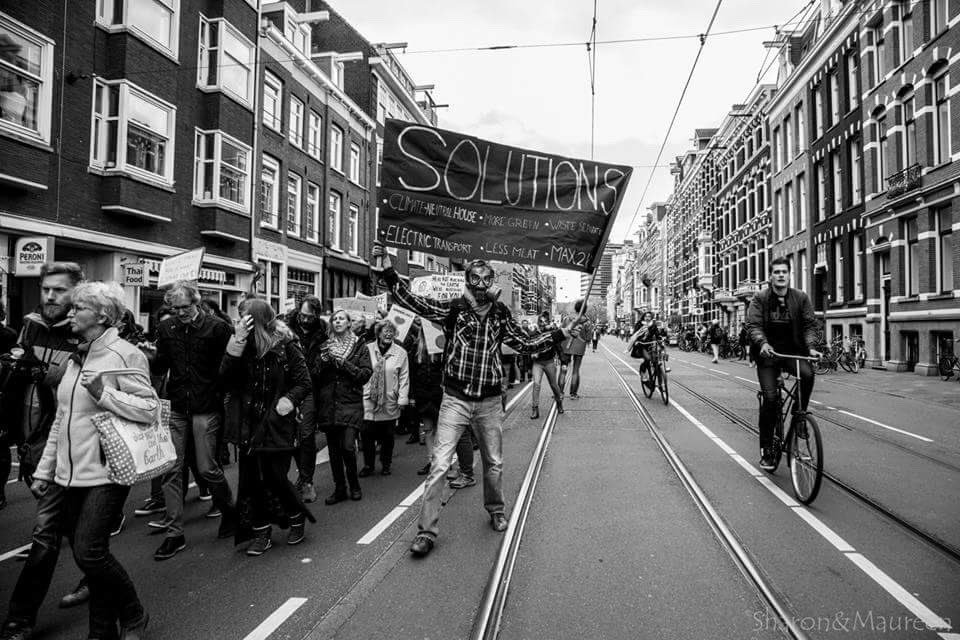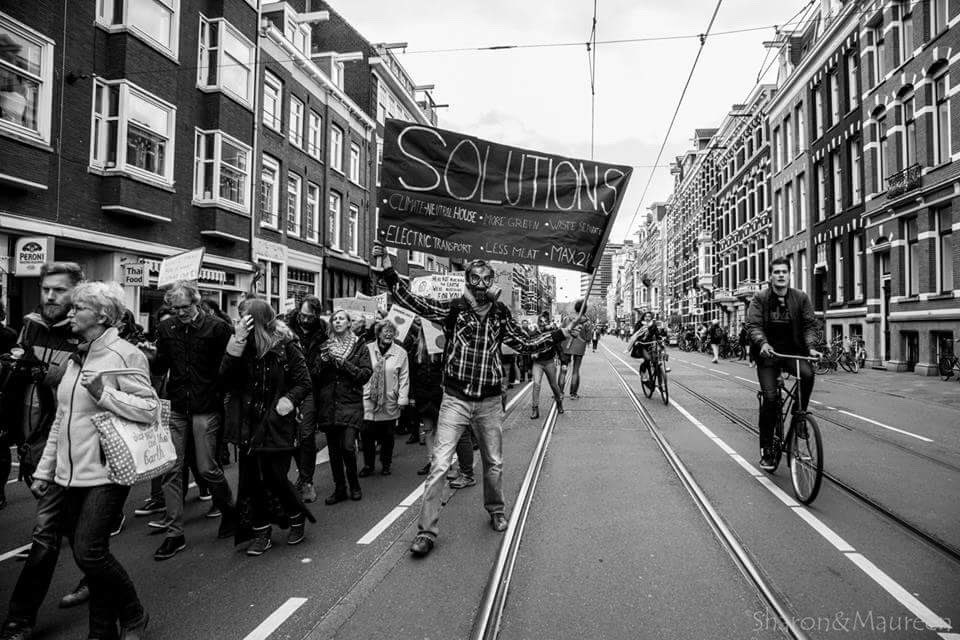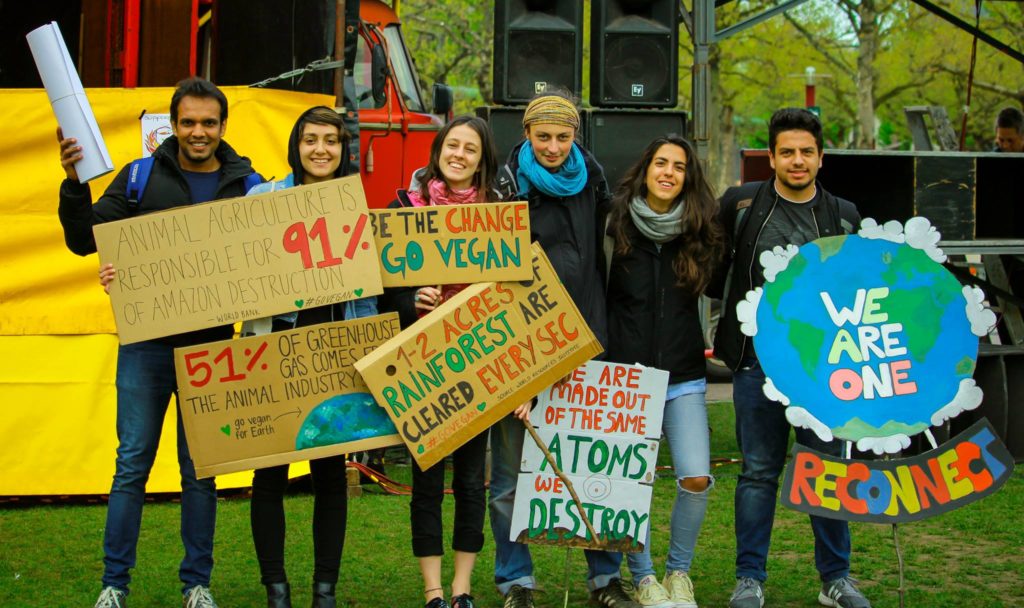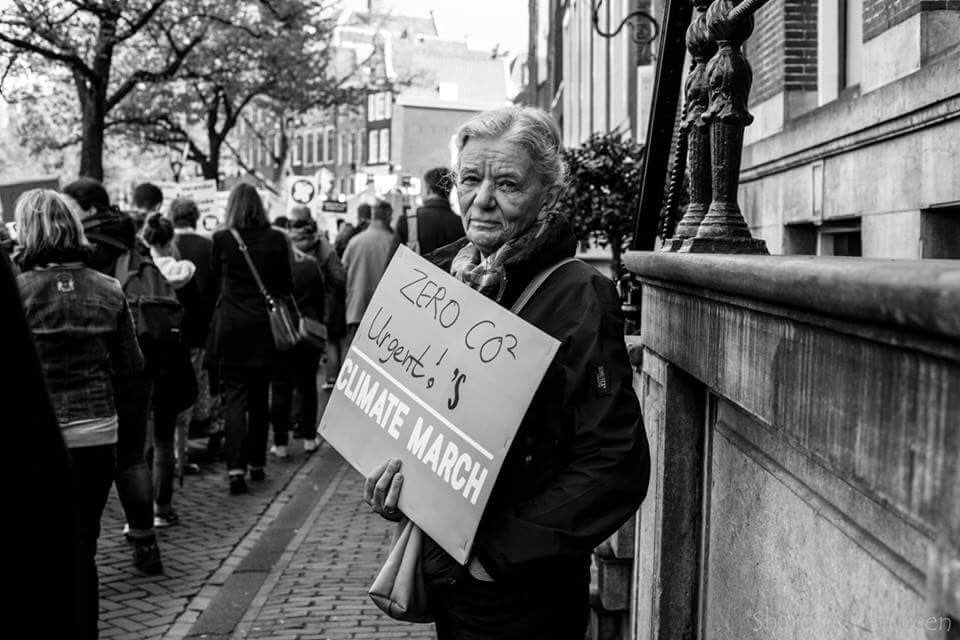Saturday was the People’s Climate March in Amsterdam. Originally, I wanted to write something about the march itself and the impact it may or may not have. I have since given up on this or any semblance of pushing my own agenda. Instead I would like to relay some of the conversations I had with people, I think they covered most of my own thoughts and will allow me to hide behind their words.
As it happened
Lets start with a quick rundown of events. The march started at 2, there was a large stage on the Museumplein belting out music and a few speeches in Dutch. The band on stage moved to a human powered float when the parade began and returned to center stage at 5 when the march returned. The energy was pretty good throughout, with the exception of a couple of lulls when things got backed up and the march came to a standstill.
Many of the onlookers smiled and took pictures, completely unaware of the events unfolding and their exact purpose. Not one face that I saw seemed upset or put off by the demonstration. During the march I tried to focus mostly on the people witnessing it. The people who did not know about the demonstration. Would this convince them to look into climate science? Might some of them march next year here or at their respective countries? Who knows.
The onlookers
To actually explain the march I think it is best to tell you about the people I met Saturday.
I then talked to some onlookers outside of the front of the Rijks. A family from Ireland, some students from Japan, a Moroccan couple, they were all smiling and taking pictures with a slight air of bewilderment, not sure if this was everyday in Amsterdam or a unique event. I approached them and asked if they knew what was going on, they said no but they all guessed basically correctly and supported the cause.
I kept walking a bit and came across a man by himself. He was smiling and having a smoke looking out over a canal when he noticed the demonstration and stopped to take some pictures. Dinnyes, a chef in Switzerland though he originally hails from Hungary. I asked him if he had ever participated in such a demonstration, he said no but that he was happy to see people taking part in something positive. We spoke a bit more, had a nice handshake and exchange of information and we parted ways.
After meeting each onlooker I could not help but think their day had been changed. The shock of seeing thousands of people march through the street with a positive attitude, making an attempt at change. I think this was the real effect of the march. To influence other people more so than the Dutch government.
Druk op the People's Climate March in Amsterdam pic.twitter.com/XEWK78z97A
— NWEA (@NWEAWind) April 29, 2017
Climate March on Amsterdam itself
I also mingled with the marchers asking them about their motives and what they hoped to achieve. The first marcher I spoke with was Daniel, it was his first demonstration. He said he used to be more passive about such situations but realized recently that unless people stand up for whats right, nothing will ever change. I cannot say he is wrong. And it was nice to see a young Dutch student getting involved for the first time. More on him later.
The next demonstrators I spoke with were Abdel and Yet (I had lost my pen at this point and desperately hope I am spelling their names correctly). I ran into Abdel looking on at the parade as it had slowed to a stop turning onto the gracht.
He and Yet were hopeful about the protest and were happy to see so many people getting involved in a variety of ways. I saw Yet toward the end of the march and she was near the front happily keeping pace still in high spirits. I was quite tired from all of the monarchic celebrations throughout the week but the positivity of protesters like her and the onlookers like Dinnyes helped me stay optimistic.
On the gracht I spoke with another woman, Eva, with NDSM.nl. She said her reason for being at the march is that she is working on incorporating more alternative energy in the Netherlands and wants to help work with Shell on an alternative energy future. She was staying pragmatic and looking for solutions that can start to be implemented now. I gravitated towards these sorts, more practical solutions for the here and now is always a good place to start.
The man on the porch.
While I was bypassing the gridlock on the gracht I asked people walking and staring on the opposite side of the canal what they thought of the march. Since it was a bit more removed than on the streets, they were less accurate with their guesses than the initial batch. One man with his children was looking on from across the way. I asked them if they had a guess about what it was they were seeing.
They said ‘no’.
I filled them in and asked the man if he agreed with the march.
He responded with a smile and a ‘no’.
I asked him if he could explain why he did not agree with the march.
His answer succinct. ‘No’.
We had a laugh and he proceeded to tell me.
His words were somewhat true even if not easy to swallow. He said that such marches do not sway governments. He was skeptical that the new coalition would look at such a demonstration and actually change policy accordingly. Pragmatically, he is completely correct, this will not accomplish the mission of effecting the new government which was the stated goal on Facebook. But there is clearly more to a demonstration than what one organizing group puts on Facebook.
Wrapping up the procession
Here I would like to skip to the end. The march itself, again, seems irrelevant to recount for people who were not there. Nothing crazy happened and you can basically imagine it. People chanting, one stage singing enviro-friendly songs, people all pushing similar but different agendas, and honestly it was not too chaotic or worth mentioning. The only relevant information I found was what the people thought of their own actions on this day.
I caught up with some of the people I had talked to earlier in the day near the end and asked them what they thought of the demonstration. Daniel was pleased as was Yet, they considered the march a success and I would have to agree.
The student activists
One group stood out to me throughout the day. A group of vegan student activists. When I saw them at the end of the march I had to inquire more about their motives and what they thought of the march. I spoke with two of the activists, Krishnakumar and Andrea. Both are studying at Rheinwaal University in Germany and made the trip to Amsterdam for the sole purpose of marching for the climate. They had signs with facts like ‘51% of greenhouse gas comes from the animal industry’ and other tidbits that did not force veganism. But gave compelling environmental reasons for going vegan none the less.
I sat down with the two in the middle of the concert going on at the end of the march. I spoke with Krishnakumar first. He was disenchanted with the Media and felt that the people he has seen around the world are not doing enough to stand up to injustice.
I think the essence of what Krishnakumar said was best embodied in one sentence he said, ‘if you feel something is wrong, you must do something.’ Simple, elegant, and he put his money where his mouth is by showing up on Saturday. He was following the concept of responsibility laid out by the great rebels of the past century, Mahatma Gandhi, Martin Luther King Jr, Nelson Mandela, and the like. Ktishnakumar felt that things must be done on an individual level first in order to impact others around you. By practicing what he preaches to the best of his ability it was easy for me to feel that even in my attempt at not eating a lot of meat maybe I should go full vegetarian or even vegan. Enthusiasm and hope poured out of him and I found myself being swayed.
Andrea later noted that she had seen the impact individuals can have on the group saying, ‘Not all of us are vegan, but it has made more of our peers aware.’ Aware.
One girl who went with their group became more interested in the Vegan cause after learning about it. She may not ever be a full blown vegan but I know that as a result of Saturday at least one person had learned about the climate impact of eating meat. That is progress. Not everybody knows the various ways we impact the earth and raising awareness for the impact of cosmetics, garments, livestock, and other issues is a necessary first step.
I asked Andrea rather vaguely ‘does protest work?’
She paused, ‘Depending on your aim. ‘Work’ is vague. It raises awareness. It gets people curious, and that works… As long as people are curious and they are willing to take new information, then you can consider that progress.’
I continued, ‘do you think this [vegan] message is maybe a bit shocking to some?’
‘Yeah I think so. Me and some of my girls here are vegan and have been for a few years now. I can see how it would be a little too much for some to take in. I’m all for progress and baby steps. Doing little bits until you get there.’
While other people were pushing their NGO’s or their social clubs, most of the people I met were individuals coming together to support the environment from their own angle. Not trying to gain much in return other than awareness.
I wish I could add the entirety of my interviews with these two student activists but that would likely fill another article or two. Long story short they see problems in the world but they also have small scale solutions to implement now while we work on the bigger issues. Reducing ones meat intake is a simple first solution but there are hundreds of other avenues from the media, to politics, to student movements that must all be taken for change to be made. That is the best I can do to sum up my 15 minute conversation with the two students, but there was a lot more said than I can do justice here.
The Message
Initially I was looking at the parade from the man on the porch’s perspective. Clearly this would not sway the government to change their policies, but maybe like the student activists seemed to think, it would raise some awareness.
Baby steps can really add up. There were quite a few young people I spoke with who said it was their first protest of any sort or one of the first they had ever been too, including a nice young Fries man. This alone was reason to celebrate. People are getting more involved and hopefully next year this same march can pull more people and more the year after that.
I do not think the stated goal of the protest, the NGOs, the band playing or anything else that annoyed me initially is the basis of this story or even that relevant. The unaffiliated people who made up the march are the ones who deserved to be heard, not the people who brought their own sound equipment.
Onlookers were smiling and taking pictures they will hopefully share. They were amazed. The people marching were energized by this and it truly felt like there was communication between the onlookers and the marchers even if rarely between individuals. I was disenchanted when I first arrived at the march. It felt more like a festival than a protest. But the kind people I met throughout the day made that cynicism quickly fade.
Will the new government change its climate policy because upwards of 8000 people walked around for a few hours? Not likely. Did hundreds, if not more, look on in wonder at this procession in a way that hopefully showed a sense of solidarity to people from around the world? Yes. That is why these marches in international capitals can be so influential. It is not just the native and local population that sees these protests but tourists from all over the world I spoke with were happy to see so many out for the cause.
This was truly uplifting. Regardless of anything else, Saturday belonged to the majority of the people there without an ulterior motive, to make the planet a little bit better and inspire others to join the cause.
Here is a carbon footprint calculator. If you’re interested in making small changes that help the earth look into your impact and ways to reduce it. And look out for the peoples climate march next year as well as other ecological and social demonstrations coming up this year around the country.






